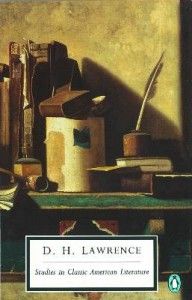More Lawrence
Last week, I featured D. H. Lawrence. I'm following up with this additional DHL that I published five years ago. I've been going back through, checking out these FtH pieces. I'm definitely going to have to consider bringing them back.

D. H. Lawrence, Studies in Classic American Literature. My version: Penguin, 1977.
I earlier introduced this book and presented a handful of passages. This post merely presents a spate of other passages that merited highlighting.
| “There is such a thing as evil belief: a belief that one cannot do wrong.” p. 109. |
Which is, of course, the ailment of most politicians. They acknowledge verbally that they can do wrong, then plow ahead like they can't.
| “The harder a man works, at brute labour, the thinner becomes his idealism, the darker his mind. And the harder a man works, at mental labour, at idealism, at transcendental occupations, the thinner becomes his blood, and the more brittle his nerves.” p. 113. |
Good observation, that, but a bit troubling. If true, all work is bad, and we know that's not the case. Man is called to sanctify his work, and he can hardly do so if work leads him to darkness or brittleness. Work, leavened with grace (which implies balance and right outlook), gives peace.
| “[Melville] was a modern Viking. There is something curious about real blue-eyed people. They are never quite human, in the good classic sense, human as brown-eyed people are human: the human of the living humus. About a real blue-eyed person there is usually something abstract . . .”. p. 139. |
Startling observation. I'm not sure what to make of it, except to note that I have blue eyes . . . and that I think I should move on quickly.
| “It seems absurd to class people according to their implements. And yet there is something in it. The heart of the Pacific is still the Stone Age; in spite of the steamers.” p. 141 |
Marshall McLuhan wouldn't think it absurd. Implements (media) shape our pursuits, our ideas, our attitudes. To the man with a hammer, everything looks like a nail. That cliché has a lot of truth in it.
| “I am a moral animal. And I'm going to remain such. I'm not going to be turned into a virtuous little automaton as Benjamin would have me. . . I am a moral animal. But I am not a moral machine.” p. 22 |
Right on. Lawrence wrote these words about Ben Franklin's Autobiography. Franklin, of course, would've done better to be an animal than a machine, since his moral machine was broken.
| “[T]he most idealist nations invent most machines. America simply teems with mechanical inventions, because nobody in America ever wants to do anything. They are idealists. Let a machine do the doing.” p. 38. |
De Tocqueville, I think, would've concurred.
| “The desire to extirpate the Indian. And the contradictory desire to glorify him. Both are rampant still, today. . . The minority of whites intellectualize the Red Man and laud him to the skies. But this minority of whites is mostly a high-brow minority with a big grouch against its own whiteness. “ p. 41. |
Quite prescient, beating James Burnham and his observations about “white guilt" by about forty years. Of course, this problem lessened greatly after November 4th.
| “I should think the American admiration of five-minute [tours] has done more to kill the sacredness of old European beauty and aspiration that multitudes of bombs would have done.” p. 45 |
Amen, which is one reason I've never been to Europe. Money and family commitments and a vague unrest about flying are the real reasons, but this one has always lurked in the background.
| “[E]very American citizen is free to force his presence upon you, no matter how unwilling you may be.” p. 45. |
It reminds me of an incident in my early twenties. I took my car to the shop and had to wait 45 minutes for the repair. I sat down in the waiting room with a book of Plato dialogues. Another customer walked in and grabbed a cup of coffee, sat down a few feet from me and said, “Might as well get a cup if it's free!” I put my book down and listened to him for the next 45 minutes. Even so, those were halcyon days compared to today, when blaring TVs occupy every corner of American space where a person might have to sit for more than ten minutes. Those old days of talkative Americans gave a person a choice: be saintly and lend your ear or tell the person to shut the hell up. Today, there is no choice. If you turn off the TV in, say, a hospital waiting room, someone is going to react like you just urinated on his leg and then fink you out to the hospital police.
A harbinger of Kerouac:
| “The Open Road. The great home of the Soul is the open road. Not heaven, not paradise. Not 'above'. Not even 'within'. The soul is neither 'above' nor 'within'. It is a wayfarer down the open road. . . . Not through charity. Not through sacrifice. Not even through love. Not through good works. Not through these does the soul accomplish herself. Only through the journey down the open road.” p. 181. |
Finally, perhaps my favorite passage in the book:
| “Whitman's mistake. The mistake of his interpretation of his watchword: Sympathy. The mystery of SYMPATHY. He still confounded it with Jesus' LOVE, and with Paul's CHARITY. Whitman, like all the rest of us, was at the end of the great emotional highway of Love. And because he couldn't help himself, he carried on his Open Road as a prolongation of the emotional highway of Love, beyond Calvary. The highway of Love ends at the Cross. There is no beyond.” p. 182 |
